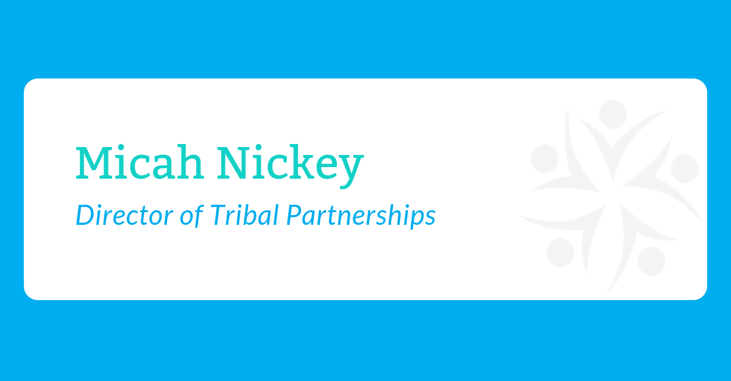For many Native Americans, a history of trauma, poverty and other factors have made mental health issues a way of life. Native Americans are 1.5 times more likely to experience mental illness than the general population, and three times more likely to compound the problem with substance abuse. For Native Americans living in tribal communities, the situation is made worse by the fact that access to treatment is often hours away.
Micah Nickey knows firsthand the difficulties these communities face, and the role that telepsychiatry can play in helping to solve them. A Sicangu Lakota and an enrolled member of the Mississippi Band of Choctaw Indians, his extensive behavioral health background includes his role as behavioral health director for the Forest County Potawatomi Health and Wellness Center. It was during his time there that he was first exposed to Regroup, when the company was hired to provide telepsych services. Micah recently joined Regroup, where he felt he could have an even greater impact in delivering quality care to Native Americans across the country.
Here, Nickey discusses how telepsychiatry can help tribal populations access much-needed, high-quality mental health care, and how these communities can tailor care to their specific needs.
1. You previously worked in behavioral health care for a tribal community. What inspired you to join Regroup?
I really bought into [Regroup CEO] David [Cohn]’s vision of telepsych as a way to bring badly needed quality mental health care to people who otherwise had no way good way to access it. Tribal communities are in very isolated areas and, with the national shortage of psychiatrists, it’s that much harder to recruit and train clinicians. As a result, our people often wait anywhere from two to six months to see a counselor. That’s why so many of them go untreated. I often hear, “I want to go see a counselor,” but there’s no one for them to see. Regroup offered me a way to change that whole dynamic.
2. What are your day-to-day responsibilities at Regroup?
Since telepsychiatry is a new concept to many tribal communities, a big part of my role is talking with tribal health care providers to explain what it is and how it can serve that community’s specific needs. My other focus is working to make sure we provide the best, most appropriate care to our existing tribal partners. That includes cultural sensitivity training for our clinicians to make sure they understand the special challenges of tribal communities, from intergenerational trauma to substance abuse problems.
3. Why is expanding mental health access so important in tribal communities?
I’ve been in this field since 1999. The high addiction and mental illness rates are very difficult to reconcile. It’s a huge argument in the mental health field: Does the patient have a mental health issue, or is it an addiction issue? I think you need to deal with what’s happening today; you can deal with mental health when their mind is clear. Helping people get better starts with helping them think more highly of themselves. Our culture is a culture of values like empathy, respect, wisdom and generosity. Many of our people need mental health treatment to return to those values, but they need to be able to access that help when they are ready to seek it. It’s unfair for them to have to wait for months. The ultimate goal is to improve mental health by increasing access to treatment.
4. What are the biggest challenges tribal communities face in adopting telepsychiatry?
Tech challenges are a big one. I often run across different Native American communities that are very scared about the changes they need to make. The whole idea of increased access and virtual health care is scary to them, even though telehealth has been around for a long time. For tribal communities, it’s still a very new venture, so uptake is slow. For the most part, people are scared that they don’t have the necessary skills to deal with the tech. Their other worry is they think they don’t have the budget, that it’s going to cost them ten thousand dollars in equipment. In reality, of course, the equipment investment is a thousand dollars or less in many cases. They’re always very surprised and pleased to hear that.
5. What sets Regroup apart from other providers in serving the needs of tribal communities?
Our ability to provide culturally sensitive clinicians is incredibly important to tribes. As therapists, we can often make mistakes if we don’t know better. There must be a rapport between the clinician and patient; otherwise, patients shut down instead of working through their issues.
Beyond that, I’d have to say it’s our wraparound support, especially for tribes that may be new to telepsych. We help guide our partners through all the technical, clinical and operational aspects of their programs and provide hands-on support at every step. When I was with Forest County Potawatomi, an account team from Regroup literally showed up at our door to talk through some issues and help us find a successful resolution. I was floored that they cared enough to do that. They are truly committed.
6. What's one thing you want tribal communities to know about telepsychiatry?
It’s a lot like TiVo. It’s a great product, but when it first came out, it was a little scary to people. They weren’t sure they wanted tech to have that much power. With telepsych, I want to take the fear out of the equation and help people understand that the technology is easy to use. If you have FaceTime, it’s basically the same idea. If tribal communities think they need a Ph.D. in technology to implement telepsychiatry, they’re going to shy away from using it. The key is to eliminate the fear factor so that more people can ultimately get the help they need.
Hear What Our Director of Tribal Communities Says About Native American Mental Health
To learn more about Regroup's culturally sensitive mental health providers, contact us or read about our partnership with Forest County Potawatomi.
.png?width=170&height=100&name=Array_rgb%20(1).png)

